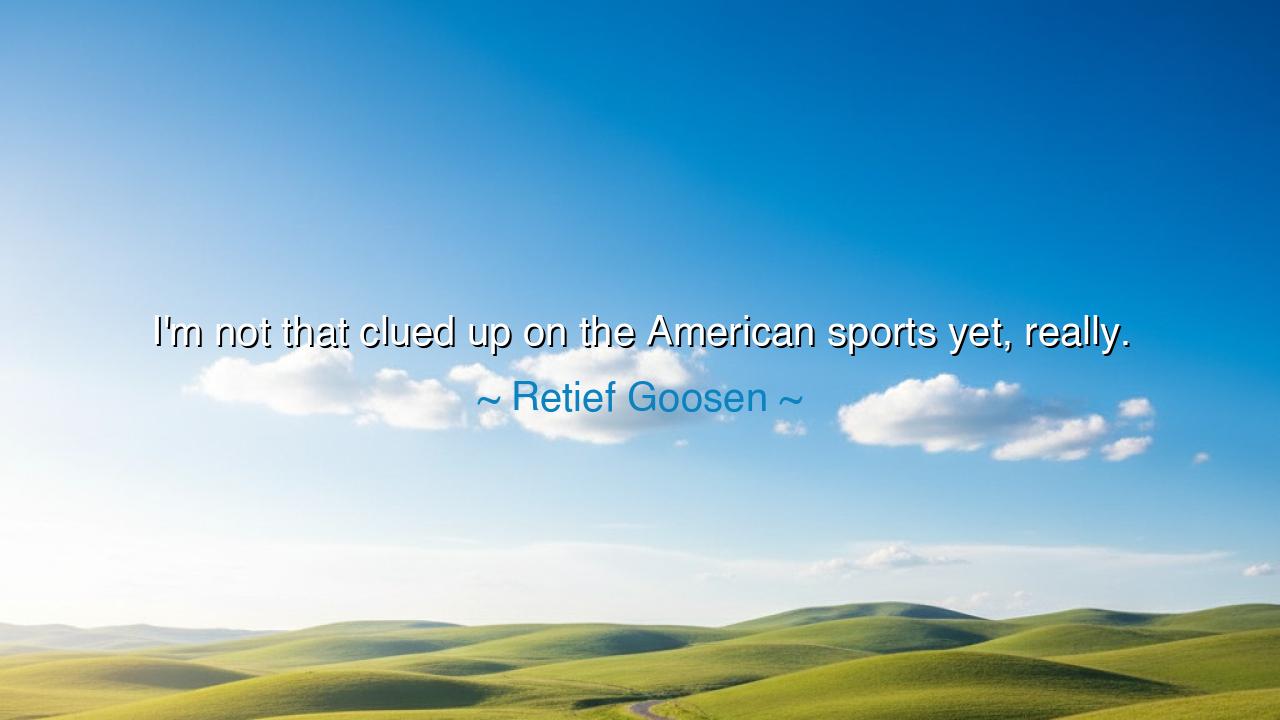
I'm not that clued up on the American sports yet, really.






Hear the humble words of Retief Goosen, master of the fairways, who confessed with honesty: “I’m not that clued up on the American sports yet, really.” At first, these words seem but a simple admission of ignorance, a remark of little weight. Yet when pondered deeply, they reveal the eternal truth of the stranger entering a new land, of the traveler who finds himself amidst unfamiliar customs and games. For in this world, each people has its own rhythms, its own sacred contests, and to stand outside them is to feel, for a time, like an exile.
The meaning of this saying lies in humility. Goosen, though a champion in his own sport, does not pretend to mastery over what he does not know. He acknowledges his distance from American sports, and in that admission shows wisdom greater than arrogance. For the wise are not those who claim knowledge of all things, but those who know the boundaries of their understanding and confess them freely. His words remind us that to enter another culture is to first listen, observe, and learn, before speaking with authority.
The origin of such a truth can be traced to the stories of the ancients. When travelers from Greece journeyed into Persia, or Romans into Egypt, they encountered rituals, contests, and customs strange to their eyes. Many were tempted to mock what they did not understand, but the wisest sought instead to learn, to see the meaning behind the unfamiliar. Thus, to say “I am not clued up” is not weakness, but the first step in the path of wisdom, the recognition that every land has its own soul, and every people their own games.
Consider the story of Alexis de Tocqueville, who traveled from France to America in the 19th century. He confessed his initial bewilderment at the democracy, the customs, the fervor of the people for their peculiar ways. Yet he did not dismiss what he did not know. Instead, he studied, he asked, he observed, until he returned to his homeland with insights that would echo through the ages in his Democracy in America. His journey began, like Goosen’s, with honest admission: I do not yet understand. From this humility was born great wisdom.
The lesson is clear: when confronted with what is foreign, do not rush to judgment, nor pretend mastery where there is none. Admit freely what you do not know, for this opens the heart to learning. To confess ignorance is not shameful; it is the soil in which true knowledge grows. The arrogant man closes his mind by pretending to understand, but the humble man, like Goosen, prepares himself to learn the games of the world, one by one.
Practical actions must follow. When you enter new lands, new jobs, new friendships, approach them with humility. Do not hide behind pride; speak openly of what you do not yet understand. Ask questions. Listen with patience. Learn with eagerness. For every culture, every community, every group has its own games—its own language, its own rhythms, its own values—and only those who admit their ignorance may ever come to truly know them.
And so, child of tomorrow, remember Goosen’s gentle confession. “I’m not that clued up yet.” Let these words be your armor against arrogance, and your key to the treasury of wisdom. In humility you will learn, in patience you will grow, and in time the foreign will become familiar. For the world is vast, filled with countless games and customs, and no one can master them all. But he who admits ignorance prepares himself for understanding—and he who understands builds bridges where others build walls.






AAdministratorAdministrator
Welcome, honored guests. Please leave a comment, we will respond soon